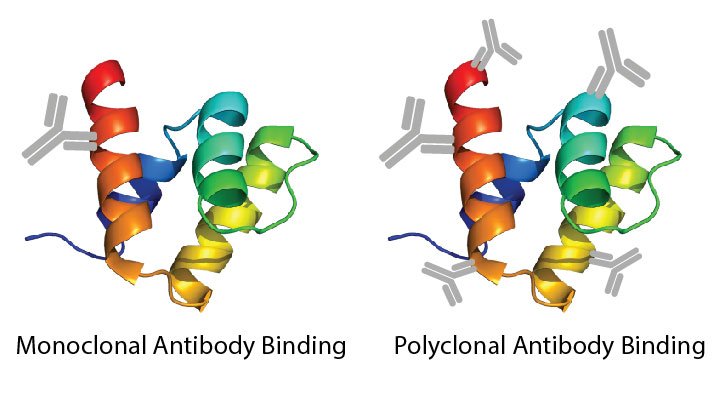Primary Antibodies
Primary antibodies are immunoglobulins (monoclonal or polyclonal) developed to bind specific epitopes with high specificity on proteins, carbohydrates or small molecules for use in many assay platforms such as flow cytometry, ELISA, western blotting, fluorescent imaging, microscopy and others. Characteristics such as affinity, cross-reactivity, solubility, class and isotype are considered when selecting a primary antibody for a specific application. The primary antibodies developed and manufactured by Leinco Technologies are available purified or conjugated to enzymes or fluorescent dyes. Each antibody conjugate is optimised and tested in the intended applications for your use.
Monoclonal & Polyclonal Primary Antibody Differences
Polyclonal antibodies are a pool of antibodies originating from different B cells in a host animal that recognise more than one epitope on the same protein or antigen. In contrast, a monoclonal antibody is an antibody originating from a single B cell in a host animal that recognises only one epitope or binding site on a protein or other antigen. Polyclonal antibodies are usually purified from the serum of an immunised host animal such as a rabbit, chicken or goat. Whereas monoclonal antibodies are usually purified from cell culture media supernatant from the growth of a hybridoma cell line. Monoclonal antibodies are divalent but monospecific. Polyclonal antibodies are also divalent but consist of a pool of antibodies with multiple epitope specificities.

Monoclonal Antibody Pros
- Batch to Batch consistency and highly scalable manufacturing
- Highly specific to one epitope minimising cross-reactivity
- Excellent as a capture antibody in a sandwich ELISA assay
Monoclonal Antibody Cons
- More time-consuming to develop the cell line for production
- Cell lines used for production must be stored in liquid nitrogen
- May be less sensitive for the detection of low-level antigens
Polyclonal Antibody Pros
- Shorter timeline to have antiserum from the host animal ready for purification
- Higher avidity provides a robust detection signal
- More likely to recognise proteins in both the native and denatured state
Polyclonal Antibody Cons
- Batch to Batch variabilities do to different host animals
- Increased chance of cross-reactivity to other proteins
- Antigen affinity purification and absorption chromatography may be required to minimise cross-reactivity
Originally posted by Leinco Technologies Inc. on: https://www.leinco.com/primary-antibodies/
Caltag Medsystems is the distributor of Leinco Technologies’ products in the UK and Ireland. If you have any questions about these products, please contact us.
